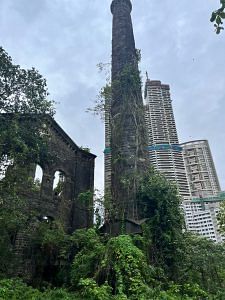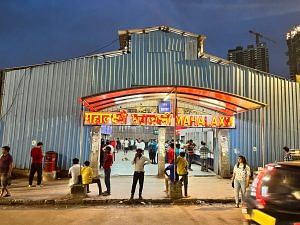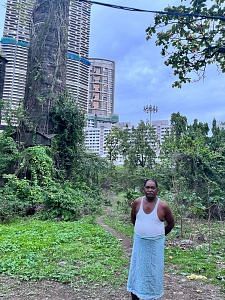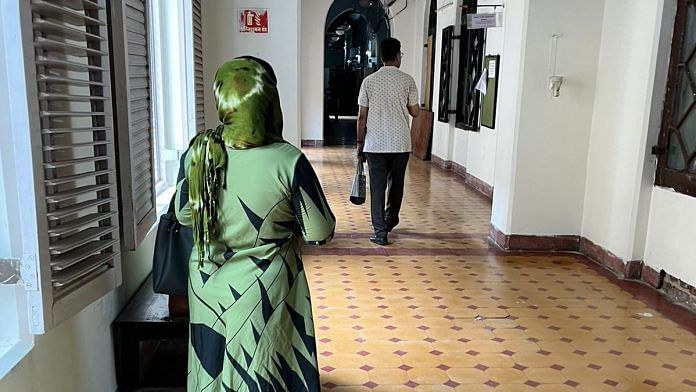Nine years ago, the police would cover her up in a burqa and sneak her in through the back gate every time the Shakti Mills gangrape survivor appeared in court. They wanted to protect her identity from being flashed across television channels. Today, she has found another, better, way to escape that identity. She wants to enrol in a nursing degree college in Nashik. The 15 July deadline is looming, and she needs to pay Rs 2 lakh. But the court compensation of Rs 5 lakh is taking forever.
The money is stuck in red tape, transfers and ‘lunch hours’ of the court rooms.
“The wound to be treated urgently, and not after it’s rotten,” she said while explaining the compensation delay in nursing language. She has already studied to be an auxiliary nurse and midwife. During both the Covid waves, when hospitals needed medical staff, she worked as a temporary nursing assistant.
Two young women—a teenager and photojournalist in her 20s—were gang raped in the abandoned ruins of Shakti Mills in 2013. While the 22 August attack on the photojournalist interning with a magazine grabbed the attention of the nation, a teenager, too, had been raped at the same spot, less than a month earlier, on 31 July.
The teenager, Akansha (name changed), who is now 26-years-old, has found her calling in helping others as a nurse, but first, she has to successfully navigate the labyrinth of cops, courts and compensation lawyers.

The endless wait for compensation
On a sultry Mumbai afternoon, Akansha sat on a bench outside room number 20 in the Mumbai sessions court with her mother. They came prepared for a long rainy day –an umbrella, vada pav, a water bottle and a file of court orders in her case. She points to the room where she had given her testimony nine years ago. But today, her patience is running thin. The lunch hour is stretching too long.
“When will it be over?” she asks the assistants.
The Shakti Mills gangrape caught national attention, coming as it did after the 2012 gang rape case in Delhi, and was transferred to a fast-track court. But ‘fast’ is an elastic and relative term.
It’s not really about the seemingly never-ending lunch hour. In the past nine years, Akansha’s life has been upended beyond recognition.
Retelling her story multiple times, undergoing invasive checks, appearing for day-to-day hearings, completing a two-year trauma counselling session, overcoming a three-year gap in completing her school examination, temporarily escaping the neighbourhood sexual harassment, discovering her calling in nursing, doing a six-month Auxiliary Nursing Midwifery (ANM) course – Akansha has felt the unbearable burden of waiting. Now, even the lunch hour is beginning to sting.
“I just want to run away from here and seek comfort in easing people’s pain,” she says. But her education and career hinge on the compensation that she has been promised.
Ever since she received that call from the crime branch in December 2021 about her compensation, she started mapping her future. She researched general nursing and midwifery (GNM) colleges and filled forms for entrance examinations while attending multiple sessions in court.
Less than a year after she was gang-raped, a Mumbai sessions court that was hearing both Shakti Mill cases together found five men guilty in March 2014, three of whom were given the death sentence. But seven years later, in November 2021, the Bombay High Court commuted the death sentences to life imprisonment after her rapists appealed against the trial court’s verdict.
Also read: Rape not ‘ravishment’ — why courts should stop use of this archaic & patriarchal word
Battling red-tape
For Akansha, it meant reopening wounds that had barely healed, but instead of dwelling on the fate of her rapists, she honed in on the compensation she was due. The Bombay High Court, while setting aside the death sentence, notified the state that the survivor of a gang rape is entitled to a compensation of Rs 10 lakh under the National Legal Services Authority (NALSA) scheme. It further said that she is also entitled to compensation under Maharashtra State Victim Scheme.
The court directed that the judgment be sent to District Legal Service Authority (DLSA) clarifying that they should notify the survivor and disburse the amount within 30 days from the date of receipt of the judgment. Akansha did get a call from the crime branch in December 2021, informing her that she would receive the compensation. But she has yet to get the money. In fact, the amount was halved to Rs 5 lakh.
In February 2022, the Mumbai District Board for Criminal Injuries Relief and Rehabilitation, after a meeting with the principal sessions court judge, decided to cut the amount by half.
She hasn’t received that amount either. “I never went to the court to ask for this money. But it is the court who said, I am entitled to this amount, and that is when I started dreaming again. A nursing life full of respect,” she said.
In March, she submitted her bank details in the sessions court. It’s July now, almost seven months and seven court visits—but the courtroom assistant asked her to wait for a week. This was on 27 June. Clearly, the said week has passed, with no compensation in sight.
She walks out of the court, looking at the cuts on her left wrist. “Seven times—I tried to kill myself.”
Also Read: New marriage bill can cast the criminality net wider, draw more Indian women to courts & cops
The day that changed her life
Second among three sisters, Akansha always felt compelled to help her widowed mother. She remembers the day she got a job at a telemarketing firm when she was in Class 10. It was 19 July 2013. She was so excited to be able to support her family in some way.
“I was enrolled in evening school. I did my job during the day and attended classes at night,” she told ThePrint. On 31 July, after finishing work, she decided to visit Mahalaxmi temple with her friend Karan.

They boarded a local train from Bhandup and got down at the Mahalaxmi railway station at 7:30 pm. As they walked towards the temple, she stumbled on a stone and injured her left foot. They decided to head back home as she was bleeding and in severe pain.
In her testimony to the court, she said that passersby had told them that the shortest route back to the station was through the premises of the abandoned and dilapidated Shakti Mills. While moving through the unkempt and desolate area, Akansha’s injured foot got entangled in a creeper. She and Karan were resting on a raised platform, when two men–later identified as Mohammed Kasim Shaikh Bangali and Mohammed Salim Abdul Kuddus Ansari–attacked them. They tied Karan’s hands with Akansha’s dupatta and dragged her away. When she started shouting for help, a third person–Mohammed Ashfaq Dawood Shaikh —joined them, along with Vijay Jadhav and one juvenile.
A water bottle, a quilt, a used condom, a single shoe, a torn shirt and a broken bracelet, its blue and white beads strewn across the ground, bore silent testimony to what followed. They were later seized by the police as evidence.
It was already late by the time the assailants left them on the railway tracks. Akansha did not want to go home. She told the court during the trial that she feared her mother would kill herself if she learned of what had happened.
Karan asked a friend for a loan of Rs 1,500, which he used to buy a t-shirt from a vendor on the over-bridge. They spent the entire night at Chhatrapati Shivaji Maharaj Terminus (CSMT), and left for Chhattisgarh on the Mumbai-Howrah Gitanjali Express. By then—her mother, who was panic-stricken when her daughter did not return home that night—had lodged a missing person’s complaint with the local police.
Upon reaching Chhattisgarh, Akansha called her mother to pacify her. She promised that she was safe with a friend and would return home soon. They stayed in a village with Karan’s relatives.
Also read: ‘She’s not always a woman to me’: Court cases on ‘gender-deception’ highlight true cost of stigma
Justice, but no empathy
On 1 September 2013, Akansha returned to Mumbai and told her mother and later the police that she was gang raped. By then, the nation’s outrage and ire were trained on the gang of men—including one juvenile—responsible for raping the photojournalist at Shakti Mills.

Initially, the local police did not make the connection between the two rapes. A still traumatised Akansha was unable to recall the location or the name, Shakti Mills. It was only with the help of Google Maps that they zoned in on the crime scene. And it was then that the police connected the dots. Three of the men who raped the photojournalist were found guilty in Akansha’s case as well.
The District Crime Branch CID took over the investigation of both cases. An officer involved with the case told ThePrint, “We were under immense pressure. This was after the Nirbhaya rape case [in Delhi in 2012]. There was only one news and that was Shakti Mills rape case.”
Both rape cases were tried simultaneously in the sessions court. Thirty-one witnesses testified in Akansha’s case, and 44 in the photojournalist’s case. Less than a year after the gang rape, on 20 March 2014, the sessions court came back with a guilty verdict. Kasim, Salim, along with another gang member Vijay Jadhav were awarded death by hanging (which was later set aside by the Bombay High Court), while Ashfaq was sentenced to life imprisonment.
Justice was served to both women—but by a legal system too jaded to be empathetic. A male doctor was initially assigned to Akansha after she gave her statement to the police. It was only when she refused to be examined by him that she was assigned a female doctor, but she had to go to another government hospital where she was subjected to a ‘two-finger’ test.
Both the sessions court and Bombay High Court, while hearing the cases, criticised the use of the ‘unscientific’ two-finger test.
Also read: Rape is a war crime that goes unpunished
Akansha’s fight continues
Last year, Akansha ripped her copy of the court verdict, which she had kept for years, into shreds. “Every time I looked at it, I felt like scratching my skin, wherever they touched me. So last year, I got rid of it,” she says.
DN Salvi, the special public prosecutor in the case who represented the state in the Bombay High Court against the appeal of the convicts, wants to continue fighting. “I have sent a draft to the law ministry to appeal in the Supreme Court for death penalty. The state’s counsel in the Supreme Court shall take it forward.”
But Akansha wants nothing to do with it. She has cut her hair and mapped out her career. It’s a way to fight trauma and bouts of depression she suffers from to this day. In their one room tenement in a chawl in the suburbs of Mumbai, as her mother speaks about the future and a “new life,” Akansha suddenly freezes. Her eyes glaze over looking into nothingness. Her mother shakes her, and she emerges from her ‘stupor’, trembling. “Every scene is in front of my eyes. I can see them touching my skin, my body, my hair,” she says, as she scratches her skin furiously.
The bitterness over the past clashes with her hope for the future, the conflicting emotions playing out on her face. Education, she said, is the way out. Three years after she was gang raped, she returned to the same government school to complete her Class 10. She then chose commerce in junior college (Classes 11 and 12) as her mother could not afford the fee for science. “I work in other people’s houses. How would I afford such an expensive course? I had to marry my younger daughter too,” said her mother.
Akansha’s eyes brighten as she talks about her career as a nurse. “Every time a child says thank you after a painless injection, my heart fills with joy and pride. I feel immense respect and comfort in nursing.”
Nursing is her chance of not just helping people but leaving the area she grew up in. She lives with her mother in a small room, with no indoor plumbing or toilet, at the end of a chawl in the suburbs of Mumbai. Over the years she’s become inured to the innuendos from some of the neighbours, be it the 80-year-old drunkard or the 15-year-old teenage boy who equated what happened to her with being easily available.
She distrusts the media, which hounded her when the story broke. But she’s formed a bond with the photojournalist who was raped. “She came with her mother to visit us. We didn’t speak much in the first meeting, but later we became each other’s strength. We stayed in touch for months, but have gone our separate ways now,” says Akansha. Her eyes glaze over again, almost as if she has gone back to that evening on 31 July 2013.
Also read: A rape forgotten—50 years ago, Mathura was denied justice. Then society betrayed her
The haunted Shakti Mills
Spread over 25,067-square metres, Shakti Mills near Mahalaxmi Station, like other old mills, was once the beating heart of Mumbai’s working class. Today, its derelict façade in the middle of overgrown grass, evokes fear and suspicion.
After the rapes, boundary walls were constructed, and guards were posted at the mill. Sant Kumar Sharma from Uttar Pradesh’s Sultanpur, who works as a guard with his cousin said, “For a salary of (Rs) 15,000, we deal with wild snakes and insects.” At night, police patrol the area, while a pack of street dogs keep watch, their barks echoing through the silence of the vast compound.
Akansha has never gone back to Mahalaxmi. And she has yet to visit the famous Mahalaxmi temple, the one she and Karan had decided to visit on 31 July 2013.
This is an investigative three-part series on decades-old gang rape cases where ThePrint examines systemic prejudice, implementation of laws, and the women’s lives long after the public gaze veered away from them.
(Edited by Zoya Bhatti)



